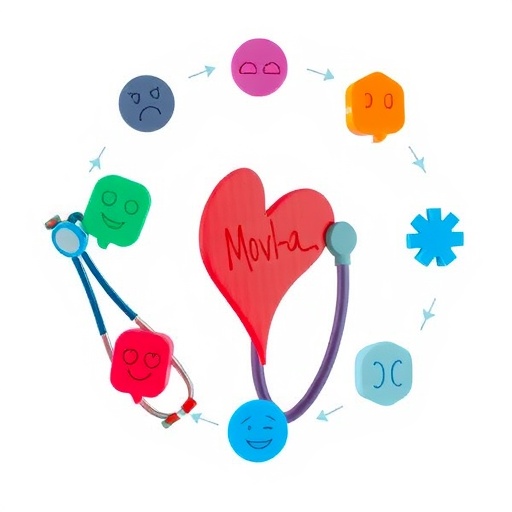The landscape of medical education is continuously evolving, with innovative approaches to motivation taking center stage. A novel study conducted by scholars, including Murshidi, Abdallat, and Hammouri, delves into the intricate realm of meta-motivational strategies employed by medical students in Jordan. As the demands of medical training become more rigorous, understanding how students maintain their motivation can provide vital insights into enhancing educational frameworks and ultimately improving patient care.
As the study indicates, the complexities of medical education require more than traditional pedagogical methods to engage students effectively. The participants in the study showcased a variety of meta-motivational strategies that significantly influenced their learning experiences. By examining these strategies, researchers aim to illuminate actionable pathways that educational institutions can adopt to bolster student performance and mental well-being throughout their demanding training.
The study is particularly relevant in light of the increasing pressures faced by medical students in Jordan. The intense workload, coupled with the emotional toll of clinical education, often leaves students grappling with feelings of burnout and inadequacy. By focusing on meta-motivational strategies, the research proposes that students can better navigate these challenges, ensuring sustained engagement with their studies and improved outcomes not just academically, but also in their future roles as healthcare providers.
A critical aspect of the study involves understanding the intrinsic and extrinsic factors that motivate students. Intrinsic motivation, characterized by a genuine interest in learning and personal growth, has shown to correlate with higher levels of academic achievement. Conversely, extrinsic motivation, which can include grades, scholarships, and parental expectations, while effective, may lead to a more superficial engagement with the material. The researchers advocate for a balanced approach, where institutions foster environments that encourage genuine interest alongside acknowledgment of external pressures.
Participants in the study reported employing a variety of self-regulation techniques that allowed them to manage their time and resources effectively. For instance, strategies like setting personal goals, utilizing peer support systems, and engaging in reflective practices emerged as pivotal in maintaining motivation. By fostering a culture of self-awareness and personal accountability, medical schools can contribute to the development of future physicians who are not only competent but also resilient in their practice.
The findings of this exploratory study underscore the importance of tailored educational strategies that cater to the unique needs of medical students. Educational institutions are encouraged to create curricula that incorporate these meta-motivational strategies, potentially reshaping how medical training is approached. By integrating motivational psychology principles into the curriculum, schools can nurture a healthy learning environment where students feel empowered, supported, and motivated.
Furthermore, the researchers emphasize the need for a mentorship framework within medical education. Establishing connections between experienced clinicians and students can play a pivotal role in motivation. Mentors serve not only as role models but also as conduits through which students can gain insights into the realities of medical practice. This access to real-world experiences helps to ground their education in practical application, enhancing both motivation and retention of knowledge.
Another focal point of the study is the role of well-being initiatives in medical education. Mental health and wellness have increasingly gained recognition as critical components of successful medical training. By promoting mental health resources and implementing programs that foster well-being, institutions can mitigate burnout and combat the adverse effects of stress that plague medical students. This proactive approach can lead to a healthier, more productive learning environment where students can flourish.
The researchers also draw attention to the significance of peer interactions in maintaining motivation. Building strong study groups and fostering community can have a profound effect on a student’s educational journey. Collaborative learning creates a sense of camaraderie, reduces feelings of isolation, and encourages shared accountability. The mutual support provided by peers can reinforce the notion that they are not alone in their struggles, thereby enhancing motivation through collective resilience.
Moreover, as the study outlines, technology plays an increasingly essential role in modern education, including medical training. The rise of digital resources and online learning platforms offers unprecedented opportunities for students to engage with the material flexibly and interactively. Harnessing the power of technology can facilitate access to diverse learning resources, connecting students to a wider academic community that can further bolster their motivation and engagement.
As the educational landscape continues to adapt, the implications of this study resonate far beyond the immediate context of medical education in Jordan. The findings can serve as a reference point for institutions worldwide, prompting a reevaluation of current educational strategies and encouraging researchers to explore the broader applicability of meta-motivational strategies in various learning environments.
In conclusion, understanding and fostering meta-motivational strategies in medical students can yield profound benefits, not only enhancing their academic performance but also equipping them with the necessary tools to navigate the complexities of their future careers. By embracing these insights, educational institutions can play a pivotal role in shaping resilient healthcare providers who are both skilled and compassionate.
Ultimately, the research illuminates a pressing need for a paradigm shift in medical education. Institutions that prioritize the psychological and motivational dimensions of learning stand to cultivate a new generation of medical professionals who are not only academically proficient but also emotionally intelligent and adaptive in the face of challenges. This integration of meta-motivational strategies could very well redefine the future of medical training, available to countless students worldwide.
Subject of Research: Meta-motivational strategies utilized by medical students in Jordan.
Article Title: Exploring the meta-motivational strategies utilized by medical students in Jordan: an exploratory study.
Article References:
Murshidi, R., Abdallat, M., Hammouri, M. et al. Exploring the meta-motivational strategies utilized by medical students in Jordan: an exploratory study.
BMC Med Educ 25, 1617 (2025). https://doi.org/10.1186/s12909-025-08189-1
Image Credits: AI Generated
DOI: https://doi.org/10.1186/s12909-025-08189-1
Keywords: Medical Education, Motivation, Meta-Motivational Strategies, Well-being, Peer Support, Technology in Education.




